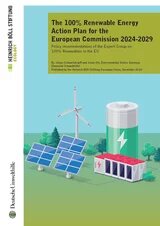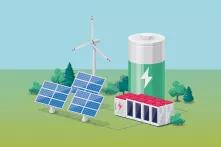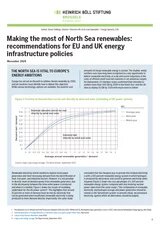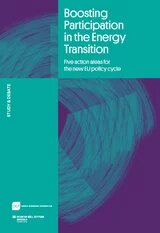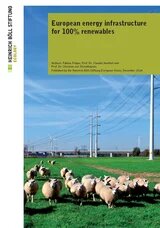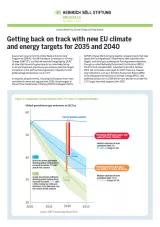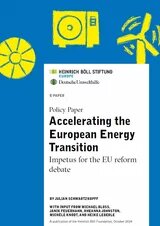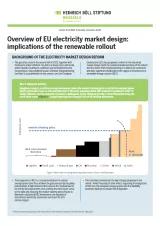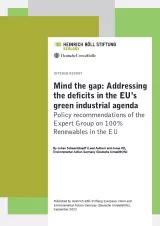Dossier
100% renewable energy in Europe
Action Plan for the European Commission 2024-2029

In this dossier with Environmental Action Germany (Deutsche Umwelthilfe), we describe how the European Union can transition to 100% renewables. A fully renewable energy supply is the most pragmatic way forward in relation to the climate crisis and exploding fossil fuel costs. Europe has an abundant potential of domestic solar energy, wind energy, hydropower, geothermal energy and bioenergy. Switching to these resources will not only lower our energy bill for power, heat and transport. Using our renewable energy sources creates jobs and adds local value in European regions because we will not lose purchase power on importing expensive fossil fuels anymore. This relieves both the environment and public budgets as using renewable energies avoids health and environmental costs caused by fossil fuels and nuclear energy.
Upcoming events
Publication
In the media
11.04.2024, Tagesspiegel Background Energie & Klima, Green Deal: Rufe nach europäischem Industrie-Deal mehren sich
4.04.2024, Tagesspiegel Background Energie & Klima, NGOs legen Aktionsplan für neue EU-Kommission vor (also here)
3.04.2024 POLITICO Europe Morning Energy & Climate, How to get 100% Renewables
2.04.2024, Table.Media’s Climate.Table, DUH and Böll Foundation: EU action plan for 100 percent renewables
2.04.2024, Table.Media Energiewende, DUH und Böll-Stiftung: EU-Aktionsplan für 100 Prozent Erneuerbare
✅ 𝗟𝗼𝘄𝗲𝗿𝗶𝗻𝗴 𝗼𝘂𝗿 𝗲𝗻𝗲𝗿𝗴𝘆 𝗯𝗶𝗹𝗹𝘀 𝗳𝗼𝗿 𝗽𝗼𝘄𝗲𝗿, 𝗵𝗲𝗮𝘁 𝗮𝗻𝗱 𝘁𝗿𝗮𝗻𝘀𝗽𝗼𝗿𝘁
Renewable energy has a price-dampening effect on wholesale power prices, as it is produced at near zero marginal cost (except for biomass as an energy source). The International Monetary Fund found that a 1% increase in renewable energy generation on average equalled a 0.6% power price decrease. This effect increases in size at higher renewable energy shares. The rapid expansion of renewable energy generation can thus contribute significantly to dampening the fossil-induced energy price shocks and inflation. This strengthens European industrial competitiveness and alleviates pressure on households. Overall, renewables have become the most competitive power generation technology for new investments and their cost advantages are set to increase even further.
✅ 𝗔𝗱𝗱𝗶𝗻𝗴 𝗹𝗼𝗰𝗮𝗹 𝘃𝗮𝗹𝘂𝗲 𝗯𝘆 𝗲𝗻𝗱𝗶𝗻𝗴 𝗳𝗼𝘀𝘀𝗶𝗹 𝗮𝗻𝗱 𝗻𝘂𝗰𝗹𝗲𝗮𝗿 𝗳𝘂𝗲𝗹 𝗶𝗺𝗽𝗼𝗿𝘁𝘀
Domestic renewable energy generation can meet Europe’s energy needs without relying on authoritarian foreign governments for a continuous supply of fuel. The EU has sufficient own sustainable potential of solar, wind, biomass, hydropower and geothermal energy within its territory to fully cover its energy demand. By switching entirely to domestically produced renewable energy, Europe will become more resilient to geopolitical crises, preventing its energy supply being weaponized by foreign governments, and build up local value chains.
✅ 𝗔𝘃𝗼𝗶𝗱𝗶𝗻𝗴 𝗵𝗲𝗮𝗹𝘁𝗵 𝗮𝗻𝗱 𝗲𝗻𝘃𝗶𝗿𝗼𝗻𝗺𝗲𝗻𝘁𝗮𝗹 𝗰𝗼𝘀𝘁𝘀 𝗼𝗳 𝗳𝗼𝘀𝘀𝗶𝗹 𝗮𝗻𝗱 𝗻𝘂𝗰𝗹𝗲𝗮𝗿 𝗲𝗻𝗲𝗿𝗴𝘆
Renewable energy technologies are the essential technologies to fight the climate crisis as they can replace all fossil fuel supply. Renewable electricity can also substitute fossil fuel use for transport and heating with zero greenhouse gas emissions and much lower environmental impacts than fossil fuels. The immense societal costs caused by climate change, the health impacts of fossil fuel combustion and the risk of catastrophic nuclear accidents are often ignored in energy policy discussions, as they are less visible or immediate than impacts on energy prices.
Accelerate renewable energy deployment
- Strengthen the EU climate and energy target architecture by adopting binding renewable energy targets for 2035, 2040 and 2045
- Improve clarity on the decarbonisation pathways followed by EU Member States through reforming the Governance Regulation
- A quick and enhanced implementation of the Wind Power Action Plan
- Update the EU Solar Energy Strategy to open up underused PV potentials
- Scale up the EU response to the global clean tech race with an ambitious Renewable Energy Investment Plan
- Hold Member States to account on the binding obligation to propose a phaseout timeline for fossil subsidies
- Propose an Action Plan for Energy Demand Reduction
Put in place the right infrastructure and flexibility for 100% renewables
- Prepare the gradual introduction of independent system operators (ISOs)
- Launch infringement procedures to accelerate the implementation of legislation for flexibility solutions by the Member States
- Update both the 2020 Strategies on Energy System Integration and Hydrogen
- Provide guidance on how to make network tariffs fair and flexible
- Revisit rules on capacity mechanisms to ensure that only 100% renewables-compatible capacity options are eligible
Enable local authorities to manage the transition to 100% renewables
- Widen the access to the Just Transition Fund to all regions that want to engage
- Refocus EU cohesion policy on delivering the energy transition and realizing its benefits for less affluent regions
- Improve the financing available to local authorities through the Energy Communities Facility
What to do to speed up offshore energy? EU-UK views on improving our energy networks - Heinrich-Böll-Stiftung European Union
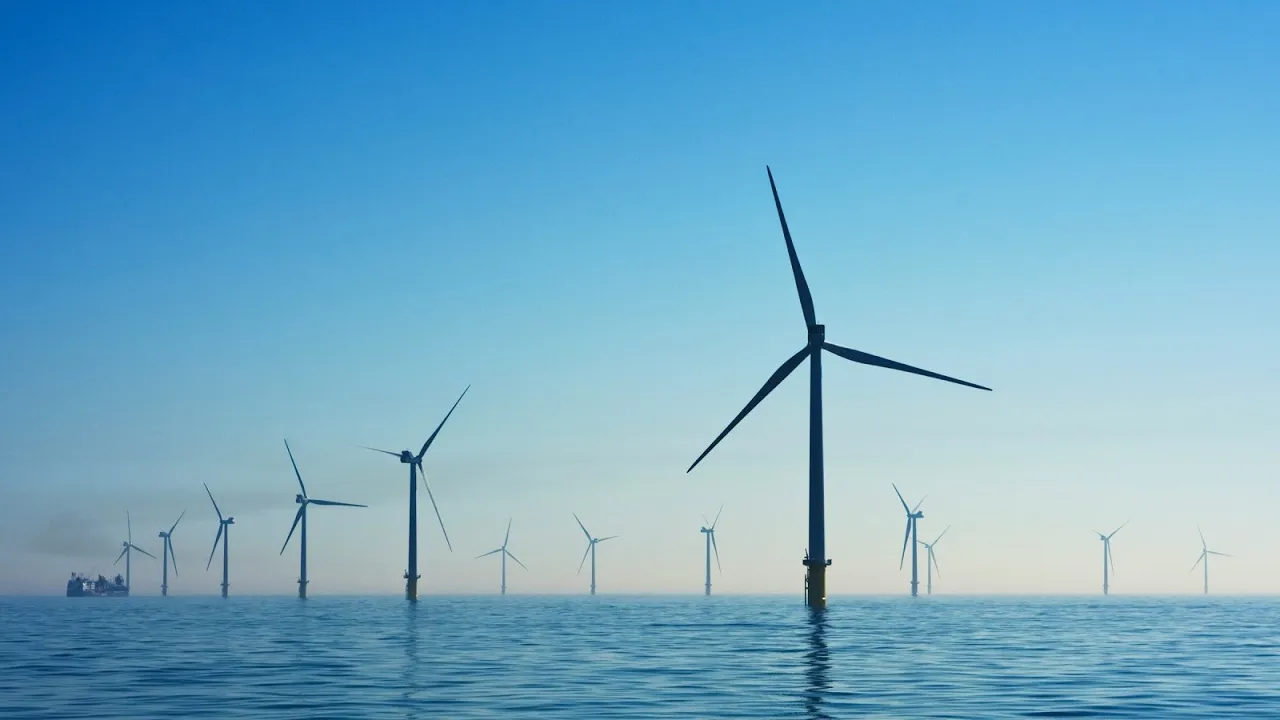 Watch on YouTube
Watch on YouTube
Back on track to Paris? Stock-taking of EU climate and energy targets beyond 2030 - Heinrich-Böll-Stiftung European Union
 Watch on YouTube
Watch on YouTube
